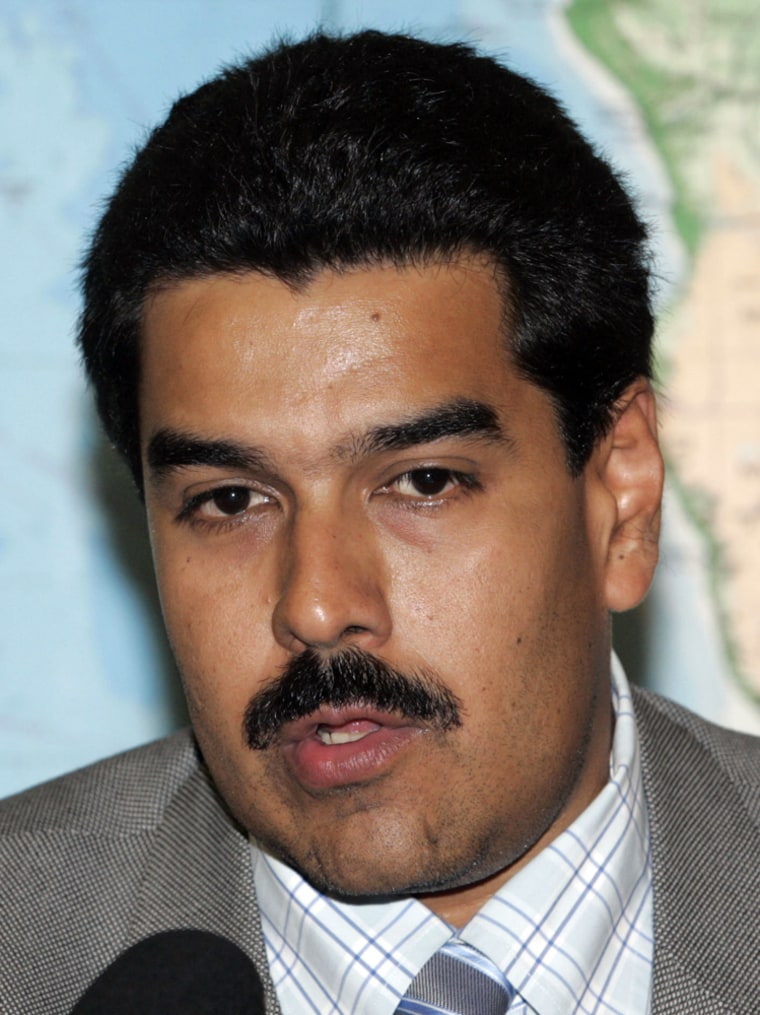Venezuela’s foreign minister said he was illegally detained for 90 minutes at a New York airport Saturday by U.S. authorities whom he accused of treating him abusively and attempting to frisk him.
U.S. and U.N. officials called the incident regrettable but said Foreign Minister Nicolas Maduro had been identified for “secondary screening” — an added security check that can kick in for a variety of reasons.
“We were the object of an illegal detention by the U.S. government,” Maduro told reporters at Venezuela’s mission to the U.N. “We were detained during an hour and a half, threatened by police of being beaten.”
Maduro said the authorities at John F. Kennedy International Airport at one point ordered him and other officials to spread their arms and legs and be frisked, but he said they forcefully refused.
He said his passport and ticket were retained for a time, and finally given back to him. But he said the incident prevented him from traveling home Saturday.
Homeland Security spokesman Russ Knocke denied that Maduro was mistreated. “There’s no evidence to substantiate any sort of abnormality in the screening process.”
The incident comes as tensions between the two countries — strained for several years — took a particularly confrontational turn. Both Maduro and Venezuelan President Hugo Chavez were in New York the past week attending the yearly U.N. General Assembly, where Chavez called President Bush “the devil” during his speech and criticized him during a stop in Harlem.
‘Frustrated’ with screening
Knocke said in Washington that Maduro was referred for further screening but never reached that section of the airport.
“He began to articulate his frustration with secondary screening right after he went through the magnetometer,” he said, referring to the walk-through metal detector. “Port Authority officials confronted him when the situation became a ruckus.” Knocke did not elaborate.
Airlines check passengers names against watch lists and apply certain criteria — such as paying for a ticket with cash — to direct passengers to a more intensive, or “secondary,” screening process.
A U.N. diplomat, who spoke on condition of anonymity because he was not authorized to speak publicly, said that Maduro’s trip was delayed because he had showed up late without a ticket, prompting the screening.
‘A regrettable incident’
“We can confirm that a regrettable incident occurred at John F. Kennedy airport for which the U.S. government has apologized to Foreign Minister Maduro and the government of Venezuela,” U.S. State Department spokesman Tom Casey said.
Maduro told the reporters that his government has been in touch with U.N. Secretary-General Kofi Annan about the incident and was gathering a team of lawyers to challenge a detention that he said violated international law.
Earlier, Chavez said on Venezuelan television that U.S. officials had detained Maduro after linking him to a failed coup that Chavez led in Venezuela in 1992.
“They have held him accusing him of participating in terrorist acts here,” Chavez said in Venezuela. “He didn’t even participate in that patriotic rebellion,” he said, referring to the uprising he led while still an army officer.
Backlash over insults
Chavez has previously called Bush a “devil,” “donkey” and “madman.” While two countries are tied by oil — Venezuela is among the top five suppliers of crude to the U.S. — relations soured sharply in 2002 after the Bush administration swiftly recognized leaders who briefly ousted Chavez in a coup, before the Venezuelan returned to power amid street protests.
Bush’s political foes and friends alike have condemned the remarks, newspapers have sharply criticized the Venezuelan leader, while a call has emerged for businesses to boycott Venezuela-owned Citgo Petroleum Corp. One U.S. governor said his state is no longer interested in buying discounted heating oil from Venezuela this winter.
Earlier Saturday, Chavez said Bush may be seeking to kill him for calling him “the devil” at the United Nations.
“Some worried friends over there have called me (to say) that because I called him the devil they have condemned me to death,” Chavez said without elaborating further on his sources.
